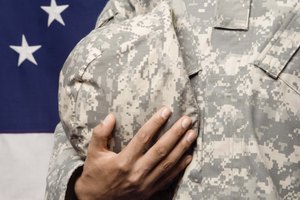Military Spouse Divorce Benefits
By Lisa Magloff

Jupiterimages/Creatas/Getty Images
Members of the United States military and their spouses qualify for a variety of benefits, such as health care, pension, and use of the base commissary and exchange. The Uniformed Services Former Spouses' Protection Act (USFSPA) allows states to treat the former spouse of a service member as a dependent. This means that following divorce, the former spouse can qualify to continue receiving some military benefits. Qualification generally depends on how long the marriage lasted and how long the service member was in the military during the marriage.
Eligibility
Former spouses can qualify to retain the same military benefits they received while married, such as health care and commissary privileges, if they were married to the service member for 20 years or more, the service member was in the military for at least 20 years and there was an overlap of 20 years or more between the military service and the marriage. This is known as the 20/20/20 rule. If the other requirements were met, but only 15 years of the marriage overlapped with military service, the spouse is entitled to only one year of medical coverage and no other benefits. This is known as the 20/20/15 rule.
Medical Benefits
Former spouses who qualify under the 20/20/20 rule can receive full medical benefits, including the military TRICARE health plan and inpatient and out-patient care at a military treatment facility. Former spouses who qualify under the 20/20/15 rule for one year of care can purchase a department of defense approved “conversion health policy” at the end of this year. The conversion policy will allow the former spouse to continue health care coverage at a reduced rate with non-military providers. Former spouses who do not qualify under either the 20/20/20 or 20/20/15 rule are still eligible for the Continued Health Care Benefit Program (COBRA). This provides 36 months of insurance with a private provider, but with the same coverage, rules and procedures as the military insurance. The former spouse will need to pay a premium for this coverage, but it is generally much cheaper than ordinary private health care.
Retirement Pay
The USFSPA allows state courts to treat a military pensions as a divisible asset. State divorce courts can grant a former spouse a portion of the military pension as a part of the divorce settlement. There is no minimum for the length of time the spouses had to be married in order for a former spouse to qualify for a portion of the service members' retirement pay. If the spouses were married for 10 years or more, and there was at least a ten year period when the marriage overlapped the service members' military service, then the Defense Finance and Accounting Service will pay the former spouse her share of the service member's retirement pay directly. This is known as the 10/10 rule. If the marriage did not last for 10 years, or did not overlap with military service for 10 years, the service member will have to pay the spouse out of the benefit he receives. Retirement pay is generally not paid to the former spouse until the service member retires and begins receiving it.
Considerations
Former spouses who qualify under the 20/20/20 rule can continue to use the base exchange and commissary services. The former spouse will generally need to obtain a new identification card from the base. A former spouse who receives full medical coverage under the 20/20/20 rule will lose this coverage if she remarries or enrolls in an employer-sponsored health insurance plan, however, commissary and military exchange benefits can be re-instated if the second marriage ends. Former spouses can also continue to be listed as the service member's designated life insurance beneficiary on the military Survivor Benefit Plan. The service member must elect "former spouse coverage" following the divorce in order for the former spouse to receive this benefit.
References
Writer Bio
Since graduating with a degree in biology, Lisa Magloff has worked in many countries. Accordingly, she specializes in writing about science and travel and has written for publications as diverse as the "Snowmass Sun" and "Caterer Middle East." With numerous published books and newspaper and magazine articles to her credit, Magloff has an eclectic knowledge of everything from cooking to nuclear reactor maintenance.